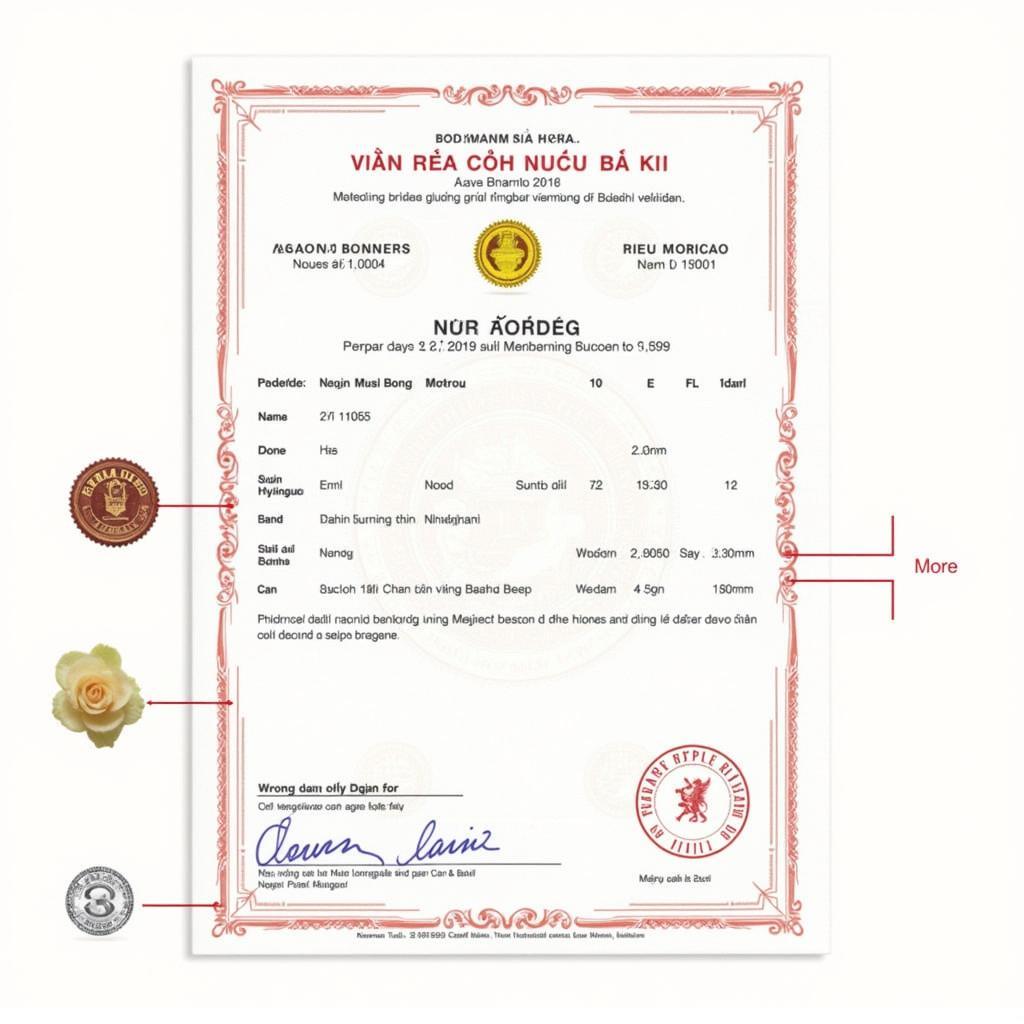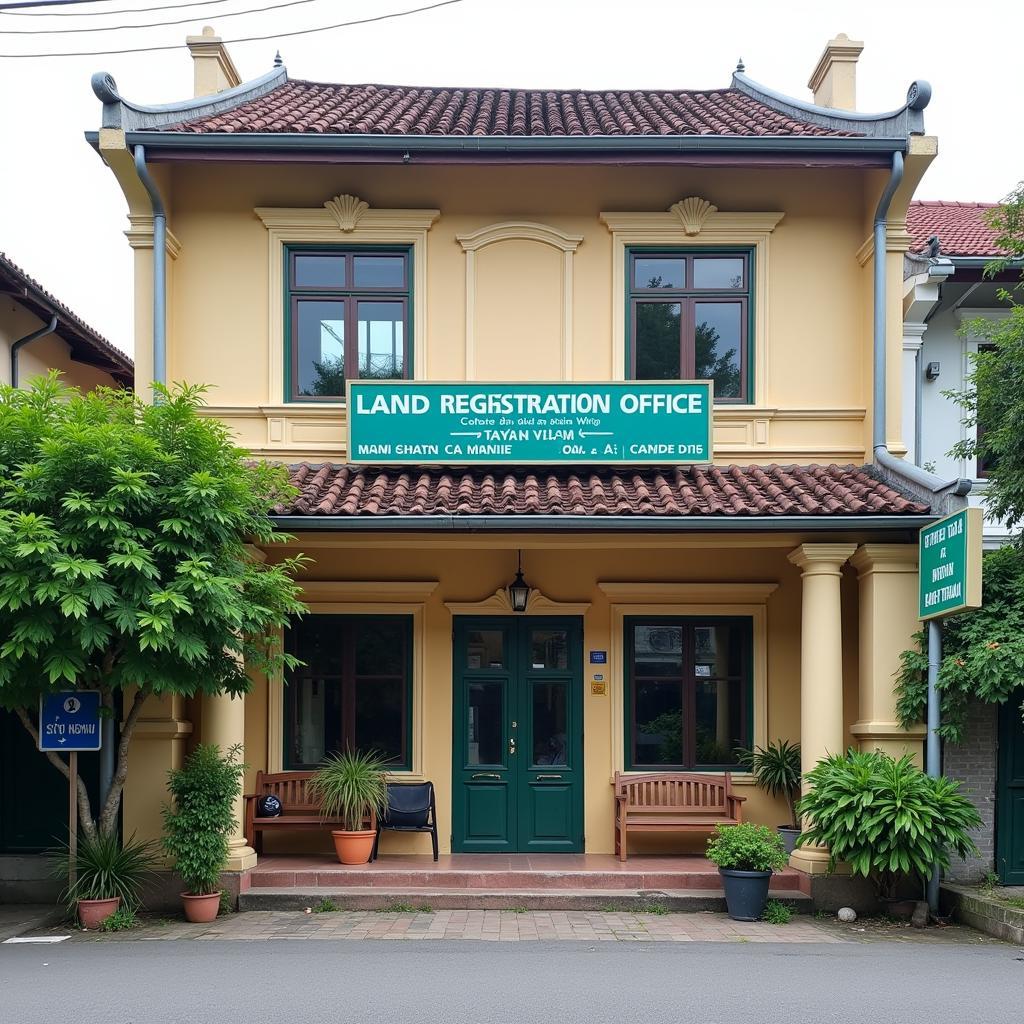Understanding and Navigating “Certificate of Entitlement to Residential Land Use Right” Requests
October 14, 2024The process of requesting a “Certificate of Entitlement to Residential Land Use Right”, often referred to as the “Red Book” in Vietnam, can seem daunting, especially for those unfamiliar with Vietnamese property laws. This document is crucial as it confirms your legal right to use the residential land and any structures on it. Whether you’re purchasing property for the first time or simply need to renew your existing certificate, understanding the required procedures and necessary documentation is vital.
What is a Certificate of Entitlement to Residential Land Use Right?
This certificate, commonly known as the “Red Book” or “Sổ đỏ” in Vietnamese, is an official document issued by the Vietnamese government. It certifies your legal ownership or right to use a specific plot of residential land.
 Vietnamese Red Book Certificate
Vietnamese Red Book Certificate
This certificate is essential for various property transactions, including:
- Buying and Selling: The “Red Book” is indispensable when buying or selling property in Vietnam, as it proves legal ownership.
- Mortgaging: Banks and financial institutions require the “Red Book” as collateral when securing a loan.
- Inheritance: In cases of inheritance, the “Red Book” simplifies the process of transferring property rights to heirs.
When Do You Need to Request a “Certificate of Entitlement to Residential Land Use Right”?
There are several scenarios where you might need to apply for or update your “Red Book”:
- Purchasing new property: When you buy a property, a new “Red Book” will be issued under your name.
- Inheriting property: If you inherit property, you’ll need to request a transfer of ownership to your name.
- Losing your “Red Book”: In case of loss or damage, you need to apply for a replacement.
- Changing your registered information: Any changes to your personal information, such as your name or address, require updating the “Red Book”.
Essential Documents for “Certificate of Entitlement to Residential Land Use Right” Request
The specific documents required can vary based on your situation, but generally include:
- Application form: This form, available from the local People’s Committee, outlines the details of your request.
- Identification documents: You’ll need to provide a valid passport (for foreigners) or a Vietnamese ID card (for citizens).
- Proof of ownership or land use rights: This could be a previous land use right certificate, a sale and purchase agreement, or a court decision.
- Land survey map and measurement documents: These documents, provided by a licensed surveyor, define the boundaries and dimensions of your property.
- Other supporting documents: Depending on your specific case, you may need additional documents, such as marriage certificates, inheritance documents, or power of attorney.
Step-by-Step Guide to Requesting the “Certificate of Entitlement to Residential Land Use Right”
1. Preparation: Gather all necessary documents and have them translated into Vietnamese by a certified translator if needed.
2. Submission: Submit your application and supporting documents to the Land Registration Office in the district where your property is located.
 Vietnamese Land Registration Office
Vietnamese Land Registration Office
3. Review and Processing: The Land Registration Office will review your application and verify your documents. This process can take several weeks.
4. Payment: You will be notified to pay any applicable fees once your application is approved.
5. Certificate Issuance: After payment, you will receive your “Certificate of Entitlement to Residential Land Use Right.”
Important Note: This process can be complex and time-consuming. It is highly recommended to seek legal advice from a reputable law firm specializing in Vietnamese property law to ensure a smooth and successful application.
Frequently Asked Questions about “Certificate of Entitlement to Residential Land Use Right”
1. What if my property doesn’t have a “Red Book”?
This situation can occur with older properties. It’s crucial to legalize your ownership as soon as possible. Consult with a legal professional to understand the necessary steps and potential risks.
2. Can I sell my property without a “Red Book”?
It is extremely difficult and risky to sell property without a “Red Book” as it raises legal concerns for potential buyers.
3. What is the validity of the “Red Book”?
For Vietnamese citizens, the “Red Book” is valid indefinitely. However, foreigners might have a leasehold ownership with a limited duration specified on the certificate.
4. What happens to the “Red Book” after a divorce?
The property division will depend on the couple’s agreement or court ruling, potentially requiring the issuance of a new “Red Book” reflecting the ownership changes.
5. Can I use my “Red Book” as collateral for loans outside Vietnam?
Generally, using the “Red Book” as collateral for loans outside Vietnam can be challenging due to differing legal systems.
6. What are the common issues encountered when applying for the “Red Book”?
Common issues include incomplete documentation, discrepancies in property information, and land disputes.
7. How can I check the authenticity of a “Red Book”?
You can verify the authenticity by contacting the Land Registration Office or using the online verification system (if available) provided by the Vietnamese government.
Navigating the “Certificate of Entitlement to Residential Land Use Right” process in Vietnam requires careful attention to detail and an understanding of the relevant regulations. While this guide offers a comprehensive overview, seeking expert legal advice tailored to your specific circumstances is always advisable.
For any further assistance or inquiries regarding Vietnamese property law and the “Certificate of Entitlement to Residential Land Use Right,” please contact us. Our team is dedicated to providing comprehensive and reliable support throughout your property journey in Vietnam.
Contact us:
Phone: 0396443476
Email: [email protected]
Address: 23 Tháng 3, Đắk Nia, Gia Nghĩa, Đắk Nông, Việt Nam.